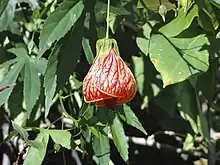Abutilon pictum
Abutilon pictum, syn. Abutilon striatum (disputed),[1] is a species of flowering plant in the family Malvaceae.[2] It is native to southern Brazil, Argentina, Paraguay and Uruguay. The plant has become naturalised in Central America, and is used in horticulture. Common names include redvein abutilon, red vein Indian mallow, redvein flowering maple, Chinese-lantern[3] and red vein Chinese lanterns.
| Abutilon pictum | |
|---|---|
 | |
| Scientific classification | |
| Kingdom: | Plantae |
| Clade: | Tracheophytes |
| Clade: | Angiosperms |
| Clade: | Eudicots |
| Clade: | Rosids |
| Order: | Malvales |
| Family: | Malvaceae |
| Genus: | Abutilon |
| Species: | A. pictum |
| Binomial name | |
| Abutilon pictum | |
| Synonyms | |
| |
Description
Abutilon pictum is a shrub growing to 5 metres (16 ft) tall by 2 metres (6.6 ft) wide.[4] The leaves are 5–15 cm long, three- to five- (rarely seven-) lobed.
The yellow to orange-red bell shaped flowers have prominent dark red veining, with five petals 2–4 cm long. It blooms from April to September, and longer in warmer subtropical areas. The flowers attract pollinators, such as native bees and hummingbirds.[4]
The Latin specific epithet pictum means “painted”.[5]
Uses
Culinary
The flowers are edible, raw or cooked, with the sweet flavor increasing the longer the bloom is open.[4]
Cultivation
Abutilon pictum is cultivated as a popular ornamental plant, for use in gardens in subtropical and warm temperate climates. It is also planted in containers or pots, on patios and balconies outdoors, or as a winter house plant.[4]
The plant can grow in light shade or full sun, and is frost tender, not tolerating temperatures below 0 °C (32 °F). It requires moist soil, preferring fertile sandy, loamy, or well-drained clay soils.[4][6]
Cultivars
Note: both Abutilon pictum and Abutilon striatum are susceptible to Abutilon mosaic virus - while A. pictum simply gets crinkly leaves, A. striatum develops a mottled or variegated leaf that is prized, and often sold as a different variety, notably "Gold dust" in Hawaii.[7]
- ‘Mardi Gras’ — Mardi Gras abutilon (syn: Abutilon pictum ‘Aureomaculatum’); very vigorous form to 10 ft. by 10 ft. but can be kept smaller/espaliered, has large green leaves splashed boldly with gold, narrow light orange flowers.[8]
- ‘Thompsonii’ — variegated Thompson's abutilon (syn: Abutilon striatum ‘Thompsonii’); speckled yellow and green variegated leaves, orange flowers:[9] this cultivar has gained the Royal Horticultural Society’s Award of Garden Merit. [10][11]
References
- "Abutilon pictum". Germplasm Resources Information Network. Agricultural Research Service, United States Department of Agriculture. Retrieved 16 January 2018.
- "Abutilon striatum". Germplasm Resources Information Network. Agricultural Research Service, United States Department of Agriculture. Retrieved 16 January 2018.
- BSBI List 2007 (xls). Botanical Society of Britain and Ireland. Archived from the original (xls) on 2015-06-26. Retrieved 2014-10-17.
- PFAF . accessed 5.15.2013
- Harrison, Lorraine (2012). RHS Latin for Gardeners. United Kingdom: Mitchell Beazley. ISBN 978-1845337315.
- Huxley. A. The New RHS Dictionary of Gardening. 1992.
- Abutilon mosaic
- Monterey Bay Nursery horticultural index: Abutilon species and cultivars Archived December 4, 2004, at the Wayback Machine.
- Gardensandplants.com: Abutilon pictum "Thompsonii" Archived June 1, 2013, at the Wayback Machine
- "Abutilon pictum 'Thompsonii'". RHS. Retrieved 14 August 2019.
- "AGM Plants - Ornamental" (PDF). Royal Horticultural Society. July 2017. p. 1. Retrieved 14 August 2019.